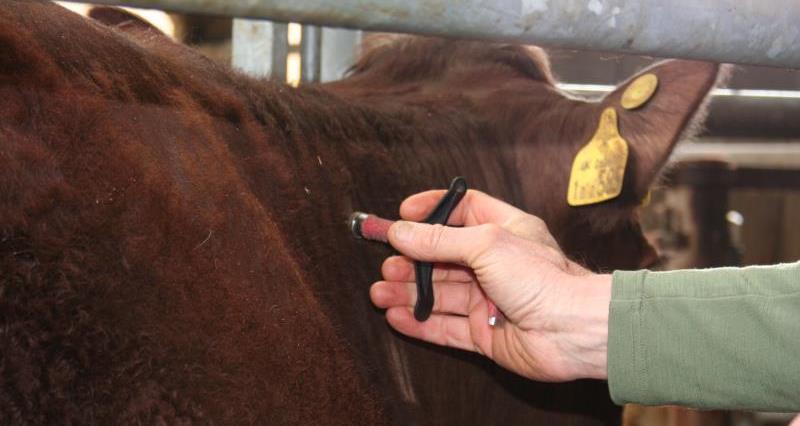Update: 7th May 2020
Advice on bTB testing youngstock?
Within England and Wales a temporary amendment to the TB testing instructions has been put in place by the APHA retrospectively from 23 March 2020, until further notice.
The APHA acknowledges that it may not be possible to carry out TB testing of young calves while maintaining social distancing guidance, as close human contact may be required to handle, restrain and test them.
As such, calves under 180 days old at the start of a routine or targeted herd surveillance TB test can be excluded from skin testing in officially TB free (OTF) herds if, in the vet’s judgement, they can’t be tested safely in line with social distancing.
This temporary amendment will be applied retrospectively to incomplete tests where the final part of the test would have commenced on or after 23 March 2020, and to any qualifying tests from now on until further notice. It will be kept under regular review while the social distancing measures related to the COVID-19 outbreak are in place.
If all eligible animals 180 days old and over have been TB tested with negative results, the test will be considered complete. Any calves 42 to 179 days old that can’t be tested safely while maintaining social distancing will be left untested until the next TB test of the herd. In the meantime, pre and post-movement TB testing rules continue to apply.
For full details of this announcement, visit the TB Hub.
Update - 24th April 2020
Food Standards Agency (FSA)
FSA are reminding livestock keepers:
- Cull dairy cows – with the changes to the dairy sector and reports of agents “advertising” for cull dairy cows ensuring that they:
- are fit to transport (lameness etc.)
- are milked in line with the requirements during transport (we are issuing reminders for the requirements in lairage)
- are “clean” – a reminder of the clean livestock policy may be helpful https://www.food.gov.uk/business-guidance/cleaner-cattle-and-sheep
- TB reactors - a reminder of the clean livestock policy would be particularly helpful (both from farming reps and we can also work with the APHA contract/local teams) given the timelines required once the animals reach the abattoir lairage https://www.food.gov.uk/business-guidance/cleaner-cattle-and-sheep
- Other livestock – a general reminder that, with the changes to the operation of the food chain resulting from Covid-19, we recognise that farmers and transporters may have varying experience of the requirements when consigning animals directly to slaughter (such as the clean livestock requirements) and where they can seek guidance/support – for example through their representative organisations, Gov.UK website AW pages etc.
Update: 20th April 2020
Animal Medicines
There are currently no known issues with availability but any shortages should be reported to the VMD
Animal owners should follow the advice of the veterinary profession:
- discuss the timing of vaccinations with their vet
- seek repeat prescriptions in good time from their veterinary practice for animals undergoing long term treatment.
More information can be found here.
Update: 3rd April 2020
NFU Cymru received an update from the Head of Bovine TB at Welsh Government on TB testing.
‘We discussed with Veterinary Delivery Partners and Unions in Wales and both parties expressed their will to continue with testing to avoid the disaster from 2001.
So TB testing should only continue if it is safe to do so.
Some farms will go overdue. TB testing may gradually go down significantly – so the only barrier protecting us from 2001 will be TB restrictions.
To mitigate their impact we waved the penalties for going overdue completely’.
Update: 27th March 2020
At this stage Welsh Government have confirmed that TB testing will continue where possible providing, if in the Vet’s judgement, the test can be conducted in line with Government advice on social distancing. Vets will make a judgement on a case by case basis, as to whether to conduct the test or not and this should be done in consultation with the farmer, ideally prior to visiting with a final risk assessment before starting the test. If the test cannot proceed for the reasons highlighted above, the vet will notify APHA. Farmers will not be financially penalised if they refuse a test on grounds of self- isolating or protecting their families, nor if the test cannot proceed following consultation with the vet. However, for disease control purposes, if TB tests go overdue, cattle on that farm will not be allowed to move (except direct to slaughter). This position is in line with the views expressed by the NFU Cymru Milk and Livestock Boards who met via Conference call on the 26th March.?
NFU Cymru is in regular contact with APHA and the Office of the Chief Veterinary Officer to raise issues and concerns raised by members as a result of COVID 19.
NFU Cymru members can view the briefing here in full.
You can contact the APHA TB advice team on 0300 303 8268 and advise the call is regarding the COVID-19 prioritisation protocol.
More information is also available from th TB Hub here.
